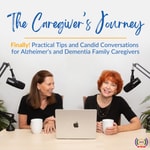The Caregiver's Journey – Details, episodes & analysis
Podcast details
Technical and general information from the podcast's RSS feed.

The Caregiver's Journey
Sue Ryan and Nancy Treaster
Frequency: 1 episode/9d. Total Eps: 41

The Caregiver’s Journey podcast is an innovative and refreshing way to learn how to tackle day-to-day Alzheimer's and dementia family caregiving challenges with strength, patience, and peace of mind. Using practical tips and candid conversations, Sue Ryan and Nancy Treaster help you navigate caregiving’s ups and downs, so you move from feeling frustrated, overwhelmed, and sometimes frightened - to confident, balanced, and supported.
Recent rankings
Latest chart positions across Apple Podcasts and Spotify rankings.
Apple Podcasts
🇺🇸 USA - howTo
28/07/2025#1🇺🇸 USA - education
28/07/2025#32🇫🇷 France - howTo
28/07/2025#63🇺🇸 USA - howTo
27/07/2025#1🇺🇸 USA - education
27/07/2025#32🇫🇷 France - howTo
27/07/2025#66🇺🇸 USA - howTo
26/07/2025#1🇺🇸 USA - education
26/07/2025#33🇫🇷 France - howTo
26/07/2025#61🇺🇸 USA - howTo
25/07/2025#1
Spotify
No recent rankings available
Shared links between episodes and podcasts
Links found in episode descriptions and other podcasts that share them.
See all- https://amzn.to/3XHWA97
7 shares
- https://amzn.to/4eoJQd3
7 shares
- https://amzn.to/4ejxvaJ
5 shares
RSS feed quality and score
Technical evaluation of the podcast's RSS feed quality and structure.
See allScore global : 89%
Publication history
Monthly episode publishing history over the past years.
How To Create a Care Plan: Five Essential Tips / Alzheimer’s and Other Dementias
Season 2 · Episode 33
mardi 22 avril 2025 • Duration 26:38
Are you prepared for others to take care of your loved one? Do you have a care plan in place? Having a comprehensive care plan is one of the most important tools a caregiver can create — not just for emergencies, but for everyday peace of mind.
We are Sue Ryan and Nancy Treaster. As caregivers for our loved ones with Alzheimer’s and other types of dementia, we’ve learned the importance of creating a care plan for our loved one. We spoke with Amanda Lukoff, co-founder and CEO of Eleplan, about what a care plan is and how to create one that works for your unique situation.
Amanda's journey to creating Eleplan was deeply personal. Her brother Liam, who has autism, is her "North Star" and the inspiration behind her career path, including going to law school for special education law. Through observing her parents' caregiving journey with Liam, Amanda recognized the need to capture all the knowledge that lived in her parents' heads so that others could provide care that truly honored who Liam is as a person.
Connect with us and share your tips:
- Website: https://www.thecaregiversjourney.com
- Donate: https://give.cornerstone.cc/thecaregiversjourney
- Instagram: https://www.instagram.com/thecaregiversjourney/
- Facebook: https://www.facebook.com/TheCaregiversJourneys/
- Linkedin: https://www.linkedin.com/in/suearmstrongryan/, https://www.linkedin.com/in/nancytreaster/
- Email: [email protected], [email protected]
Additional Resources Mentioned
- Episode 32: Navigating The Caregiver Hiring Process https://thecaregiversjourney.com/32-navigating-the-caregiver-hiring-process-five-essential-tips-alzheimers-and-other-dementias/
- Eleplan Website: https://www.eleplan.com/
- Support the nonprofit The Caregiver's Journey: https://give.cornerstone.cc/thecaregiversjourney
Full Show Notes
Takeaways
Tip 1: Start with the Basics
The first step in creating a care plan is to document the essential information that would allow someone to provide short-term care (even for just 30 minutes) while you step out.
This includes:
- Emergency contacts
- Medications and dosages
- High-level meal preferences
- Allergies
- Relevant medical conditions
Tip 2: Outline Preferences and Daily Routines
Beyond the basics, a good care plan should capture what makes your loved one unique—their preferences, personality traits, and daily routines.
Your care plan should include:
- Likes and dislikes
- Daily schedule and routines
- Bedtime and morning rituals
- Behavioral patterns
- Emotional triggers (both positive and negative)
Tip 3: Document What to Do in an Emergency
Crisis situations demand clear instructions. Your care plan should outline:
- What constitutes an emergency for your loved one
- When to call 911 vs. other resources
- Who to contact and in what order
- Special instructions for EMTs or ER staff
- Location of important medical documents
Tip 4: Collect Key Contacts and Documents
Gathering important documents in one accessible location is critical for seamless care. This includes:
- Insurance cards
- Healthcare directives
- Power of Attorney documents
- Guardianship forms
- Medical history and medication lists
Tip 5: Keep Everything Accessible and Current
A care plan is only effective if it's up-to-date and easily accessible. Amanda frames this with an important question:
"Do I have a system that is as dynamic as the needs of my loved one and the ever-changing piles of documents and information?"
Whether you're using a physical binder, shared digital documents, or a specialized platform like Eleplan, the key is having a system that makes updates easy and ensures the information is available whenever and wherever it's needed.
Read More in This Blog
Navigating the Caregiver Hiring Process: Five Essential Tips / Alzheimer’s and Other Dementias
Season 2 · Episode 32
mardi 8 avril 2025 • Duration 28:48
When the time comes to bring professional caregiving support into your loved one’s life, the process can feel overwhelming. Whether you’re hiring a caregiver for home care or to complement care in a community setting, understanding how to find, evaluate, and select the right person is crucial for both your peace of mind and your loved one’s well being.
We are Nancy Treaster and Sue Ryan, we’ve developed five essential tips for hiring a paid caregiver, based on real experiences and practical advice from caregiving experts. These insights will help you navigate this important transition with confidence and clarity.
Connect with us and share your tips:
- Website: https://www.thecaregiversjourney.com
- Donate: https://give.cornerstone.cc/thecaregiversjourney
- Instagram: https://www.instagram.com/thecaregiversjourney/
- Facebook: https://www.facebook.com/TheCaregiversJourneys/
- Linkedin: https://www.linkedin.com/in/suearmstrongryan/, https://www.linkedin.com/in/nancytreaster/
- Email: [email protected], [email protected]
Full Show Notes
Additional Resources Mentioned
- Episode 5: Home Alone https://thecaregiversjourney.com/leaving-your-care-receiver-alone-six-essential-tips-alzheimers-and-other-dementias/
- Episode 28: Home and Community Living Options https://thecaregiversjourney.com/time-for-a-change-home-and-community-living-options-five-essential-tips-alzheimers-and-other-dementias/
- Episode 30: Elder Law Attorneys https://thecaregiversjourney.com/they-know-what-we-dont-elder-law-attorneys-four-essential-tips-alzheimers-and-other-dementias/
- Episode 33. How To Create a Care Plan: Five Essential Tips / Alzheimer’s and Other Dementias https://thecaregiversjourney.com/33-how-to-create-a-care-plan-five-essential-tips-alzheimers-and-other-dementias
- Support the nonprofit The Caregiver's Journey: https://give.cornerstone.cc/thecaregiversjourney
Takeaways
Tip 1: Assess Your Loved One’s Needs
Before you begin searching for a caregiver, it’s important to thoroughly understand what kind of support your loved one requires. This assessment will guide all your subsequent decisions about the type of caregiver, frequency of care, and specific qualifications needed.
Consider these key areas when assessing needs:
- Activities of Daily Living (ADLs)
- Medical Needs
- Household Management Tasks
- Safety Concerns
- Transportation and Mobility
- Companionship Needs
Tip 2: Determine the Type of Caregiver and Frequency Needed
There are three main categories of paid caregivers, each with different training levels and capabilities:
- Companion Care
- Certified Nursing Assistant (CNA)
- Skilled Nursing
Tip 3: Understand Your Financial Resources
Review Your Financial Resources
- Savings and investment accounts
- Long-term care insurance policies
- Regular income sources
- Family financial contributions.
Explore Available Benefits
- Medicare
- Medicaid
- Veterans Benefits
Consider Family Contributions
Tip 4: Decide Between Agency or Private Hire
When you work with a caregiving agency:
- They Handle Administrative Tasks
- They Provide Backup Coverage
- They Offer Training and Supervision
- They Assume Liability
Private Hire Benefits
- It’s Usually Less Expensive
- You Have Complete Control
- There’s Often More Flexibility
- You May Find Through Word-of-Mouth
Private Hire Challenges
- You’re the Employer
- No Backup Coverage
- Limited Screening Resources
Tip 5: Evaluate potential caregivers thoroughly
Key Questions for Interviews
- Scheduling and Availability
- Qualifications and Experience
- Approach to Care
- Communication Style
Background Checks and References
Set Clear Expectations
Especially for private hires, establish from the beginning that the arrangement is on a trial basis.
Include Your Loved One When Appropriate
Next Steps: Care Plans and Integration
- Develop a written plan
- Develop an Integration Strategy
Read More in This Blog here
Delusion Support: Six Essential Tips / Alzheimer’s and Other Dementias
Season 1 · Episode 23
mardi 10 décembre 2024 • Duration 39:12
When your loved one experiences delusions or hallucinations for the first time, it can be frightening and overwhelming for everyone involved. As caregivers for our loved ones with Alzheimer’s and other types of dementia, we've learned how to navigate these challenging moments.
See Full Show Notes here
Connect with us and share your tips:
- Website: https://www.thecaregiversjourney.com
- Instagram: https://www.instagram.com/thecaregiversjourney/
- Facebook: https://www.facebook.com/TheCaregiversJourneys/
- Linkedin: https://www.linkedin.com/in/suearmstrongryan/, https://www.linkedin.com/in/nancytreaster/
- Email: [email protected], [email protected]
Additional Resources Mentioned
These resources contain affiliate links so we may receive a small commission for purchases made at no additional cost to you.
- Electronic medication dispensing and monitoring device for caregiver here
Creating Engaging Activities: Three Essential Tips / Alzheimer’s and Other Dementias
Season 1 · Episode 22
mardi 3 décembre 2024 • Duration 25:39
As caregivers for our loved ones with Alzheimer’s and other types of dementia, we often struggle with adapting activities to their changing abilities. Through our experiences, and what we’ve learned from others on their caregiving journeys, Nancy Treaster and I developed three important tips to help you create meaningful engagement that honors who our care receivers are today.
Connect with us and share your tips:
- Website: https://www.thecaregiversjourney.com
- Instagram: https://www.instagram.com/thecaregiversjourney/
- Facebook: https://www.facebook.com/TheCaregiversJourneys/
- Linkedin: https://www.linkedin.com/in/suearmstrongryan/, https://www.linkedin.com/in/nancytreaster/
- Email: [email protected], [email protected]
Additional Resources Mentioned
Other The Caregiver’s Journey podcast mentioned
Home Safety here
These resources contain affiliate links so we may receive a small commission for purchases made at no additional cost to you.
- Large plastic rings child's toy that center screws into base here
- Adult coloring book here
- Dementia friendly puzzle here
- Lavender lotion here
- Bead maze here
- Fidget blanket here
- Photo gifts
- Shutterfly here
- Memory Cafe example here
Takeaways
From the moment of diagnosis, we need to shift our focus from what our care receivers used to do to what brings them joy now.
Tip 1: Adjust Our Expectations
Our care receivers’ engagement and abilities change throughout their journey — even throughout each day.
Key points:
- Let go of ‘before’ comparisons
- Let go of outcomes
- Watch for signs of enjoyment or frustration
- Pay attention to new interests
- Adapt activities to current abilities
- Accept different ways of engaging
Tip 2: Prioritize Their Safety
As we introduce or adapt activities, safety must be a primary concern, considering both cognitive and physical abilities.
Key points:
- Consider vision changes and depth perception challenges
- Adapt activities to safely maintain independence
- Provide appropriate supervision and get creative in places to find it
- Make creative adjustments to familiar activities
- Create support networks for safety
Tip 3: Create Engaging Activities
Create activities to reflect their personal history, career, hobbies and interests, while engaging their senses. Whenever possible, engage multiple senses for a deeper connection and engagement.
Key points:
- Engage their senses:
- • Touch (e.g.: fidget blankets, textured items)
- • Sound (e.g.: familiar music, calming sounds)
- • Smell (e.g.: familiar scents, cooking aromas)
- • Sight (e.g.: colorful objects, family photos)
- • Movement (e.g.: seated dancing, simple exercises)
- Create social connections through:
- • Small group activities
- • Religious or spiritual practices
- • Memory cafes
- • Senior center programs
- • Family gatherings
When planning activities:
- Observe body language for signs of engagement or distress
- Have backup calming activities ready if they get agitated
- Remember that watching can be a form of participation
- Consider “drip grief” (see bottom of post for definition) — both yours and theirs
- Be flexible and creative in your approach
- Accept help from others who want to support you
Read Full Blog here
Meaningful Caregiver Gifts: Five Essential Tips / Alzheimer’s and Other Dementias
Season 1 · Episode 21
mardi 26 novembre 2024 • Duration 17:06
"If you give me a spa certificate but no gift of time to go with it, I'll probably never use it."
As friends and family of Alzheimer’s and other dementia family caregivers, we want to give meaningful gifts that will actually be used and appreciated. Through our experiences and what we've learned from others on their caregiving journeys, we've developed five important categories of gifts that truly make a difference in a caregiver's life.
See Full Show Notes here
Rate, Subscribe and Share Your Tips on Social Media!
Please click here to review, follow or subscribe to our podcast.
If you don’t see your preferred platform click on Podchaser and click at the bottom “Write my review”
- You can log in with Twitter, Facebook or Google
- On the right you’ll see a box with “Follow”, “Rate and Review” and “Share”
Connect with us and share your tips:
- Website: https://www.thecaregiversjourney.com
- Instagram: https://www.instagram.com/thecaregiversjourney/
- Facebook: https://www.facebook.com/TheCaregiversJourneys/
- Linkedin: https://www.linkedin.com/in/suearmstrongryan/, https://www.linkedin.com/in/nancytreaster/
- Email: [email protected], [email protected]
Additional Resources Mentioned
These resources contain affiliate links so we may receive a small commission for purchases made at no additional cost to you.
Medication Management: Four Essential Tips / Alzheimer’s and Other Dementias
Season 1 · Episode 20
mardi 19 novembre 2024 • Duration 20:55
"I wish I had started monitoring my husband's medication sooner than I did."
As caregivers for our loved ones with Alzheimer's and other types of dementia, we've learned that medication management becomes increasingly challenging. Through our experiences, and what we've learned from support groups and others on their journeys, we've developed four important tips to help you support your care receiver with medication management.
See Full Show Notes here
Rate, Subscribe and Share Your Tips on Social Media!
Please click here to review, follow or subscribe to our podcast.
If you don’t see your preferred platform click on Podchaser and click at the bottom “Write my review”
- You can log in with Twitter, Facebook or Google
- On the right you’ll see a box with “Follow”, “Rate and Review” and “Share”
Connect with us and share your tips:
- Website: https://www.thecaregiversjourney.com
- Instagram: https://www.instagram.com/thecaregiversjourney/
- Facebook: https://www.facebook.com/TheCaregiversJourneys/
- Linkedin: https://www.linkedin.com/in/suearmstrongryan/, https://www.linkedin.com/in/nancytreaster/
- Email: [email protected], [email protected]
Additional Resources Mentioned
These resources contain affiliate links so we may receive a small commission for purchases made at no additional cost to you.
- Electronic medication dispensing and monitoring device for caregiver here
Traveling: Four Essential Tips / Alzheimer’s and Other Dementias
Season 1 · Episode 19
lundi 11 novembre 2024 • Duration 23:50
“We’ve both had ‘that’ trip — the last trip that you take when you decide we’re not traveling ever again with our care receiver. Or, as we like to say, it’s the trip after the last trip you should have taken!”
We are Sue Ryan and Nancy Treaster. As caregivers for our loved ones with Alzheimer’s and other types of dementia, we’ve learned travel decisions require careful consideration. Through our experiences, and what we’ve learned from support groups and others on their journeys, we’ve developed four important tips to help you decide whether you and your care receiver should stay home or go on what could be ‘that’ trip.
See Full Show Notes here
Rate, Subscribe and Share Your Tips on Social Media!
Please click here to review, follow or subscribe to our podcast.
If you don’t see your preferred platform click on Podchaser and click at the bottom “Write my review”
- You can log in with Twitter, Facebook or Google
- On the right you’ll see a box with “Follow”, “Rate and Review” and “Share”
Connect with us and share your tips:
- Website: https://www.thecaregiversjourney.com
- Instagram: https://www.instagram.com/thecaregiversjourney/
- Facebook: https://www.facebook.com/TheCaregiversJourneys/
- Linkedin: https://www.linkedin.com/in/suearmstrongryan/, https://www.linkedin.com/in/nancytreaster/
- Email: [email protected], [email protected]
Additional Resources Mentioned
These resources contain affiliate links so we may receive a small commission for purchases made at no additional cost to you.
- Fidget blanket here
Takeaways
Tip 1: Pre-test Travel Readiness
Key points:
- Test longer car rides (at least an hour round trip)
- Try interstate driving if that will be part of your journey
- Experience crowds and noise if those will be present
- Test unfamiliar environments
- Pay attention to any existing signs of travel difficulty.
Tip 2: Evaluate All Trip Components
Key points:
- Assess sleeping arrangements and bathroom accessibility
- Consider the need for quiet space
- Evaluate support options at the destination
- Think about familiarity with locations
- Listen to your inner voice about the decision — is this the wisest choice?
Tip 3: Plan Comprehensively
Key points:
- Minimize advance information to avoid overwhelming your care receiver.
- Pack comfort items:
- Fidget blankets
- Familiar snacks
- Favorite music and headphones
- Photo books
- Familiar entertainment (DVDs, etc.)
3. Plan around normal routines:
- Meal times
- Sleep schedule
- Best times of day for different amounts of activity
4. Prepare for emergencies:
- Take IDs and insurance cards
- Bring extra medications
- Pack legal documents
- Consider anti-anxiety medication options
- Share detailed itinerary with family members
- Have your emergency contact information easy to find on your care receiver and in case something happens to you.
Tip 4: Prepare Others
Key points:
- Explain current abilities and challenges
- Provide conversation guidance
- Demonstrate proper approach techniques
- Give permission for others to opt out if they’re not comfortable
- Show grace toward those processing their own emotions
Read More in This Blog here
Search and Rescue: Three Essential Tips / Alzheimer’s and Other Dementias
Season 1 · Episode 18
lundi 4 novembre 2024 • Duration 15:45
The moment you realize your loved one with dementia is missing, every second feels critical. While the natural instinct is to immediately begin searching, having a clear action plan can make the difference in finding them quickly and safely. Through insights from John Clark, a specialized dementia search and rescue expert in Georgia, we've compiled three essential tips for these frightening situations.
Additional Resources Mentioned
Georgia Emergency Search and Rescue
John Clark USA 404-309-7386
Professionally Trained in Urban Searches
Alzheimers, Dementia, Children, Evidence Recovery, Major Disaster Search, NASAR, Disaster Assistance
Rate, Subscribe and Share Your Tips on Social Media!
Please click here to review, follow or subscribe to our podcast.
If you don’t see your preferred platform click on Podchaser and click at the bottom “Write my review”
- You can log in with Twitter, Facebook or Google
- On the right you’ll see a box with “Follow”, “Rate and Review” and “Share”
Connect with us and share your tips:
- Website: https://www.thecaregiversjourney.com
- Instagram: https://www.instagram.com/thecaregiversjourney/
- Facebook: https://www.facebook.com/TheCaregiversJourneys/
- Linkedin: https://www.linkedin.com/in/suearmstrongryan/, https://www.linkedin.com/in/nancytreaster/
- Email: [email protected], [email protected]
Takeaways
Tip 1: Make the Right First Move
Key points:
- Call emergency services immediately, before starting your own search
- Don't wait to make the call while searching on your own
- Ask if there are dementia-specialized search teams in your area
- Remember that it's okay to search after making the call
Tip 2: Provide Critical Information to Searchers
Key preparation points:
- Keep current photos readily available:
Essential information to share:
- Recent conversations and topics they've discussed
- Their maiden name or previous names
- Nicknames family members use
- Common walking routes or regular destinations
- Nearby water sources (pools, ponds, lakes)
- Places from their past they might seek out
- Their current stage in their dementia journey
- Recent behaviors or patterns
- Current medications
Tip 3: Know What to Expect After They're Found
Standard procedures:
- Medical evaluation is typical
- Transportation to hospital via ambulance or police car
- Assessment for any injuries or exposure
For More Read Full Blog here
Building Better Local Resources
Not every community has specialized dementia search and rescue teams, but there are ways to improve local capabilities:
Steps to take:
- Contact your local Alzheimer's Association chapter
- Ask about existing specialized search resources
- Inquire about training opportunities for local emergency services
- Advocate for specialized training in your community
- Network with other caregivers to share experiences and resources
Note: If you're in Georgia, specialized dementia search and rescue services are available. Contact your local emergency services or Alzheimer's Association chapter for more information.
Preparing for Holidays: Five Essential Tips / Alzheimer’s and Other Dementias
Season 1 · Episode 17
mardi 29 octobre 2024 • Duration 20:08
The secret to successful holiday celebrations with our dementia care receivers isn't perfect decorations or parties—it's having a peaceful retreat space ready for them when needed.
As caregivers navigating the holiday season with loved ones who have Alzheimer's and other types of dementia, we've learned that intentional planning makes all the difference. The holiday season brings additional activities, decorations, and visitors that can disrupt the routines so vital to our care receivers' well-being. Success requires careful observation, thoughtful preparation, and gradual adaptation of celebrations.
Through our experiences, what we've learned from support groups, and from others on their journeys, we've developed five essential tips to help create positive holiday experiences while maintaining the calm and familiar environment your care receiver needs.
Rate, Subscribe and Share Your Tips on Social Media!
Please click here to review, follow or subscribe to our podcast.
If you don’t see your preferred platform click on Podchaser and click at the bottom “Write my review”
- You can log in with Twitter, Facebook or Google
- On the right you’ll see a box with “Follow”, “Rate and Review” and “Share”
Connect with us and share your tips:
- Website: https://www.thecaregiversjourney.com
- Instagram: https://www.instagram.com/thecaregiversjourney/
- Facebook: https://www.facebook.com/TheCaregiversJourneys/
- Linkedin: https://www.linkedin.com/in/suearmstrongryan/, https://www.linkedin.com/in/nancytreaster/
- Email: [email protected], [email protected]
Takeaways
Tip 1: Preserve Daily Routines
The holidays and routines might share the same number of letters, but that's where their similarities end. While the season pulls us toward special events and gathering, we must remember that routines are the cornerstone of stability for our care receivers. These familiar patterns aren't just habits—they're vital anchors that help our loved ones navigate their days with confidence and security.
Tip 2: Be Prepared With a Calm Retreat Space
In the midst of holiday celebrations, having a sanctuary becomes essential. Think of this space as your loved one's personal haven—a place where the overwhelming stimuli of holiday gatherings can't reach. Just as we all need a quiet moment sometimes, our care receivers often require a calm, familiar space where they can retreat and regroup when festivities become too much.
Tip 3: Set Expectations With Visitors While Also Acknowledging Their Feelings
The holiday season often brings an increase in visitors, each carrying their own expectations and memories of past celebrations. While these visits can be precious opportunities for connection, they require careful management to ensure everyone's comfort—especially our care receivers. Understanding and communicating about the current reality of your loved one's condition helps create more meaningful interactions and minimize uncomfortable situations.
Tip 4: Teach Visitors How To Visit
Creating successful visits is about helping others understand how to connect with your care receiver in their current reality. As their ability to process information changes, the ways others can best interact with them evolves too.
Tip 5: Introduce Changes Gradually
The magic of holiday decorations and traditions can quickly become overwhelming for someone with dementia. What once brought joy might now cause confusion or distress. This doesn't mean we must abandon all holiday cheer—rather, we need to be thoughtful about how we introduce these changes to our environment. Think of it as slowly turning up the dimmer switch rather than flipping on bright lights all at once.
Eating and Drinking: Seven Essential Tips / Alzheimer’s and Other Dementias
Season 1 · Episode 16
mardi 22 octobre 2024 • Duration 21:54
As caregivers for our loved ones with Alzheimer's and other types of dementia, we've learned eating and drinking become significant challenges. Through our experiences, and what we've learned from support groups and others on their journeys, we've developed seven important tips to help you and your care receiver navigate dining.
Rate, Subscribe and Share Your Tips on Social Media!
Please click here to review, follow or subscribe to our podcast.
If you don’t see your preferred platform click on Podchaser and click at the bottom “Write my review”
- You can log in with Twitter, Facebook or Google
- On the right you’ll see a box with “Follow”, “Rate and Review” and “Share”
Connect with us and share your tips:
- Website: https://www.thecaregiversjourney.com
- Instagram: https://www.instagram.com/thecaregiversjourney/
- Facebook: https://www.facebook.com/TheCaregiversJourneys/
- Linkedin: https://www.linkedin.com/in/suearmstrongryan/, https://www.linkedin.com/in/nancytreaster/
- Email: [email protected], [email protected]
Additional Resources Mentioned
- Episode 13 - Incontinence Overnight here
These resources contain affiliate links so we may receive a small commission for purchases made at no additional cost to you.
- Bibs here
- Spork here
- Lowbowls here
- Grippy placemats here
- Other great caregiver dining aid products here
Takeaways
Tip 1: Observe Their Natural Eating Habits
- Observe and record how they naturally eat and drink (e.g., time of day, order, how they cut their food, which hand they use for each utensil).
- Continuously observe, adjust, and share with others who are helping your care receiver with their eating and drinking.
Tip 2: Utilize Pre-made Meals and Visual Cues
- Leave pre-made meals in easily accessible places (e.g., eye-level in the refrigerator).
- Use visual cues like notes on the refrigerator or preset table settings with a note where the plate will go that tells your care receiver where the meal is.
- Check to make sure they have actually eaten their food and finished what they had to drink so you know if they’re able to understand what to do.
Tip 3: Pre-cut Food, Adjust Portions, Observe How They’re Able to Eat and Drink
- Pre-cut food into manageable pieces.
- Consider converting sandwiches and other foods into finger foods.
- Be aware of changes in hand stability, grip strength, vision, and coordination.
- Some people with dementia diagnoses lose regulation with their appetite. It’s important for us to observe how they’re eating and the portions they’re eating to make sure they’re getting the proper amount of food.
- Introduce non-breakable drinkware, consider tops or adult sippy cups.
Tip 4: Prepare for Messier Eating
- Consider using regular bibs or large disposable bibs
- Place a towel on the chair to catch spills.
- Keep a basket of cleaning supplies (e.g. paper towels, hand wipes, table wipes) handy for quick clean-ups.
Tip 5: Simplify Eating Utensils and Tableware
- Low bowls with a slight rim make it easier to push food onto utensils
- Sporks combine the functions of spoons and forks, so one utensil can be used.
- Grippy placemats keep plates from sliding.
Tip 6: Monitor and Adjust Nutrition
- Watch for unexplained weight loss or gain.
- Consult with doctors if you notice sudden changes.
- If you move your care receiver to a memory care community, develop nutrition plans and weight monitoring processes and stay actively engaged with them.
Tip 7: Gradually Take Over Feeding and Hydration
- Position yourself closer to them at mealtimes to make assistance easier.
- What begins as prompting them to eat or drink and gradually increases to handing them their utensils and/or putting food on their utensils, showing them their drinking glass becomes modifying their drinking glass to make it easier for them to use, to eventually fully feeding them and controlling their beverages.
Read More in This Blog here
See full show notes here









![[B]OLD AGE With Debbie Weil [B]OLD AGE With Debbie Weil](https://images.mypodcastdata.com/show-images/logo_bold-age-with-debbie-weil-debbie-weil-1r96.jpg)